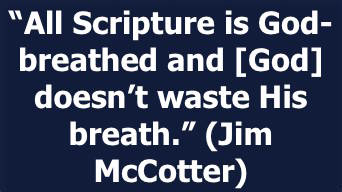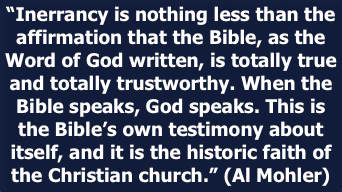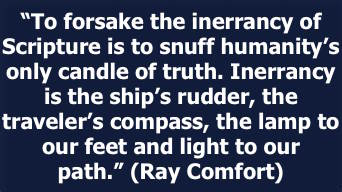Inspiration
 Inspiration is the process by which God, through the Holy Spirit, breathes His Word into His chosen human messenger, enabling His messenger to deliver or record divine revelation. Although the Bible, for a multitude of reasons, is the most unique book ever written, one reason for its uniqueness stands out from all of the others—the Bible’s claim to be the divinely inspired Word of God. Inspiration is the process by which God, through the Holy Spirit, breathes His Word into His chosen human messenger, enabling His messenger to deliver or record divine revelation. Although the Bible, for a multitude of reasons, is the most unique book ever written, one reason for its uniqueness stands out from all of the others—the Bible’s claim to be the divinely inspired Word of God.
“All scripture is given by inspiration of God, and is profitable for doctrine, for reproof, for correction, for instruction in righteousness” (2 Timothy 3:16)
The Greek word Paul uses for “inspiration” in the above verse means “God breathed.” All Scripture, according to the Apostle Paul, is God-breathed; that is, divinely inspired by God.
“Knowing this first, that no prophecy of the scripture is of any private interpretation. For the prophecy came not in old time by the will of man: but holy men of God spake as they were moved by the Holy Ghost.” (2 Peter 1:20-21)
According to the Apostle Peter, the writers of sacred writ were but scribes. The true author was the Holy Spirit, who dictated to them what to write. Therefore, the Bible is not the words of men, but the Word of God. It is divine oracle, not human opinion.
In the Old Testament, twenty-six of its thirty-nine books contain a direct statement claiming to be the Word of God. In the New Testament, the Apostle Paul not only claims to write with divine inspiration,1 but also claims that his words are not his own, but the very Word of God.2 In addition, Paul refers to Luke’s Gospel3 and the Apostle Peter recognizes Paul’s writings as divinely inspired Scripture.4
That the Bible claims to be the world’s only written revelation of God to mankind is incontrovertible. It clearly claims to be a miraculous book, the divinely inspired Word of God, not just another book, comprised of nothing more than the mere words and opinions of men.
There are two common theories concerning the inspiration of the Bible. The first is the Dictation Theory. This theory teaches that God dictated every word of Scripture to its inspired writers who in turn wrote it down word for word. This theory is also called the Verbal Theory.
The second theory is called the Dynamical Theory. This theory teaches that God inspired the thoughts rather than the exact wording; thus, freeing the inspired writers to express the exact truths in their own words and styles. This theory seems to be supported by the fact that different writers wrote in different styles and recorded the same events in different words.
 Regardless of the theory of inspiration one subscribes to, neither the Dictation nor Dynamical theory allows for any denial of the inerrancy and infallibility of Scripture. Any admittance of any error in the Bible undermines the Bible’s authority by calling into question its divine inspiration. Regardless of the theory of inspiration one subscribes to, neither the Dictation nor Dynamical theory allows for any denial of the inerrancy and infallibility of Scripture. Any admittance of any error in the Bible undermines the Bible’s authority by calling into question its divine inspiration.
If the Bible is not inspired in one place, how can we be assured that it is inspired in other places? If the Bible is wrong about one thing, how do we know it is not wrong about other things? If some of Paul’s writings were just his opinions, how do we know that the Ten Commandments were not just Moses’ idea?
To question the Bible at all is to question all of the Bible. As Ravi Zacharias has aptly put it: “The Bible is the Word of God, and God cannot err. So, to deny inerrancy, rightly understood, is to attack the very character of God. Those who deny inerrancy soon enter the dangerous terrain of denying all Scriptural authority for both doctrine and practice.”
In Jeremiah 36:21-23, we are told an interesting story that illustrates how penknives taken out to whittle away at the Bible inevitably lead to the whole Bible being thrown on the hearth. In this passage, we are told how King Jehoiakim whittled away at the divinely inspired prophecy of Jeremiah. He cut everything out he didn’t like and threw it into the fire. Of course, by the time he was through, the whole of Jeremiah’s divinely inspired prophecy had been cut-up, tossed into the fire, and reduced to ashes.
 The moral of this story is obvious, once you start whittling away at the Bible you can’t stop until all the Bible is whittled away. Once you start tossing parts in the fire you can’t stop until the whole Bible is burnt up. The Bible is either the divinely inspired and inerrant Word of God from cover to cover or it is not the Word of God at all. You must decide which it is; it is either all God’s Word or not God’s Word at all. The moral of this story is obvious, once you start whittling away at the Bible you can’t stop until all the Bible is whittled away. Once you start tossing parts in the fire you can’t stop until the whole Bible is burnt up. The Bible is either the divinely inspired and inerrant Word of God from cover to cover or it is not the Word of God at all. You must decide which it is; it is either all God’s Word or not God’s Word at all.
1 1 Corinthians 2:13; 7:40
2 1 Thessalonians 2:13
3 Paul refers in 1 Timothy 5:18 to a quote found in Luke 10:7 as "Scripture."
4 2 Peter 3:15-16
|